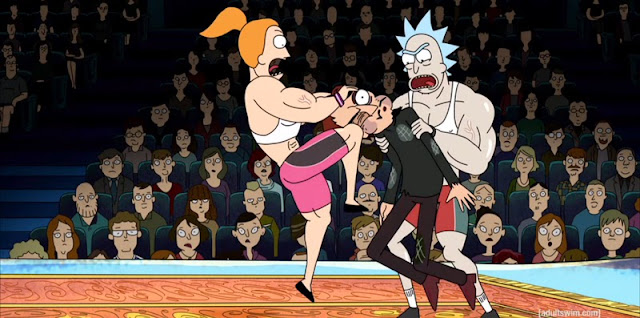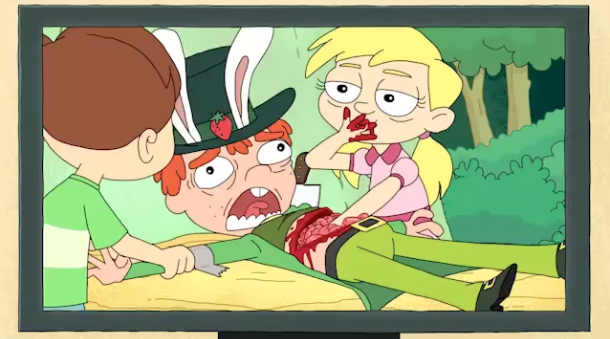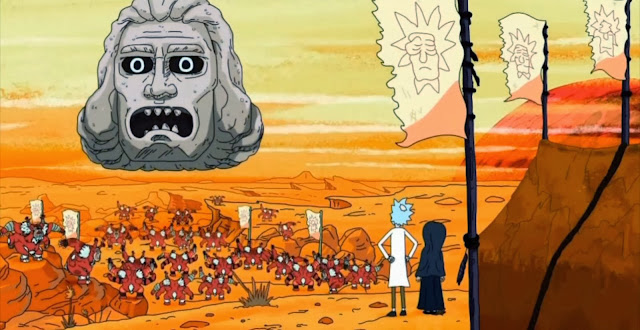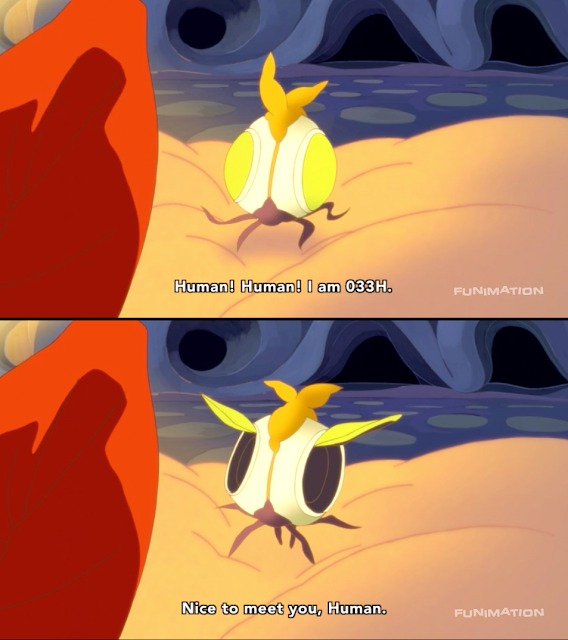Every Friday in "'Brokedown Merry-Go-Round' Show of the Week," I discuss the week's best first-run animated series episode I saw. "Brokedown Merry-Go-Round," a two-hour block of original score tracks from animated shows or movies, airs weekdays at 2pm Pacific on AFOS.
"There's pretty much literally nothing that you can't do in an episode of Rick and Morty," said Dan Harmon in a lengthy but fascinating discussion with Alan Sepinwall this week about the pleasures of co-creating Rick and Morty with Justin Roiland while he was separated from Community during its "gas leak year." "It was a beautiful, beautiful net to fall into off of the high wire that was Community."
The plot of Rick's A-story in "Something Ricked This Way Comes" epitomizes this limitlessness that Harmon loves being able to get away with doing on Rick and Morty and is unable to accomplish on Community for many reasons, whether it's because of the limitations of live action or because the Community universe is far more grounded than the Rick and Morty universe(s). In the A-story of "Something Ricked," Rick gets to take on the Devil himself (special guest star Alfred Molina), and in the A-story's best joke, this jaded man of science is never intimidated by Satan and his magic and is always whupping Satan's devious ass. That's how badass Rick is in this episode. The Devil can't outwit Rick's genius. "I may be the Devil, but your grandfather is the Devil," groans an exasperated Satan after attempting to hang himself because he can't take anymore of Rick.
At the start of "Something Ricked" (written by Mike McMahan), Satan's scheme is to run a little store called Needful Things (a reference to the Stephen King novel of the same name), where, under the name of Mr. Needful, he gives away for free to customers mysterious knickknacks that provide them with whatever they desire but also curses them. The items range from a typewriter that generates best-selling murder mysteries but makes the murders happen in real life to aftershave that makes men like Mr. Goldenfold (Brandon Johnson), Morty's math teacher, irresistible to women but causes them to be impotent.
If these items sound like plots from old sci-fi/horror anthology shows (the typewriter is reminiscent of the word processor that can rewrite reality in the Tales from the Darkside adaptation of King's "Word Processor of the Gods" short story), that's exactly what "Something Ricked" is parodying. As someone who grew up watching the original Twilight Zone, Amazing Stories and both versions of The Outer Limits (the "Alyssa Milano gets possessed by an alien entity and turns nympho" episode was, to my teenage self, the greatest Outer Limits of all time), I found Rick's nonchalant attitude towards the Devil, a frequent presence on sci-fi/horror anthology shows, to be tons of fun. Thanks to what I presume is his familiarity with black magic and otherworldly science from his interdimensional adventures, Rick is way ahead of the rest of the town and correctly guesses that Summer's boss at her new job in the store is the Devil only two and a half minutes into the episode. Rick goes back to his garage lab and builds a tricorder-like device that, as he tells Mr. Needful, "detects and catalogs all your Twilight Zone/Ray Bradbury/Friday the 13th: The Series voodoo crap magic."
If Rick built a portal gun that allowed him to enter fictional realities and then intervene in anthology show episodes (or Bradbury stories) about haunted objects like he does with the customers' curses throughout "Something Ricked," those episodes would end up being 25 minutes shorter (and those Bradbury stories would be like two pages long). As entertaining as Rick's needling of the Devil and his mocking attitude towards sci-fi anthology show tropes are (especially when Rick expands upon his detection device and opens Curse Purge Plus, a rival business across the street that helps rid Mr. Needful's victims of their curses), the sight of Rick always being victorious would have made for a disposable and one-note A-story if Summer hadn't been part of the story. Her frustrations with Grandpa Rick add some much-needed tension. She starts to favor Mr. Needful over Rick as a grandfather figure because she finds the Devil to be kinder to her than her own grandpa. Summer doesn't even care that this new parental figure she's chosen is Beelzebub. With horrible parents like hers and a standoffish asshole like Rick, she'll take whatever she can get.
 |
| (Photo source: Morty and Rick) |
Unlike Morty, Summer won't stand for Rick's jerkiness (or misogyny, like in "Raising Gazorpazorp") and is able to call him out on his shit. "Raising Gazorpazorp" pulled off the impossible: it made me actually end up liking Summer as both a character and the other voice of reason on the show besides Morty. Someone in the A.V. Club comments section astutely noted that if Rick is the Doctor and Morty is any of the companions (particularly from pre-Ace-era Doctor Who) who were just there to get the Doctor to spit tons of exposition, then Summer is any of the modern-day companions who are gutsy enough to challenge him (in other words, Summer is basically Donna Noble, but less shrill-sounding).
Rick refuses to admit that he's bothered by Summer's complaint to him that he doesn't care about anything or anyone, but of course, he's bothered by it, as we see in a great understated scene where Rick comes home to an empty house and ends up dining alone (Beth, who's underused on the show despite Harmon's love for that character and the elaborate and mostly off-screen backstory he's written for her, is absent for almost the entire episode; Summer is busy with the store; and Morty and Jerry are busy with their own B-story). At the dinner table, Rick attempts to make conversation with the little dining room robot from the cold open, which he programmed to always pass him the butter, and not even the robot will talk to him ("I am not programmed for friendship"). It's a funny "his genius is his gift and his curse" moment, and it's especially fitting in an episode about cursed people.
But when Mr. Needful Zuckerbergs Summer from the staff of his store, which he ambitiously relaunches as an online business that he renames n33dful.com, Rick proves that unlike Mr. Needful, he does care about others. Sure, Rick may be cold and heartless most of the time, but whenever someone in his family is wronged by an outsider, like when Morty was nearly sexually assaulted by Mr. Jellybean in "Meeseeks and Destroy," he always has their back. He proposes to Summer a plan to physically strike back against Mr. Needful, and she jumps right on board. But because Rick and Morty is such a twisted show, Rick and Summer's big bonding moment involves them injecting lots of steroids into each other's asses.
 |
| (Photo source: Morty and Rick) |
I'm glad the show opted for DMX's "X Gon' Give It to Ya" instead of Bonnie Tyler's overplayed "Holding Out for a Hero" for both the bodybuilding/revenge montage and the amusing post-credits tag where the roided-out duo dishes out justice on the streets and beats up a neo-Nazi skinhead, a playground bully, an anti-gay Westboro Baptist Church member (and what a great time to air an episode featuring this sight gag too, due to Westboro hate-monger Fred Phelps' death) and a man abusing his dog. Between Mazzy Star, Belly and now DMX, Rick and Morty has been killing it in the existing songs department.
The B-story in "Something Ricked" pales comedically in comparison to the A-story, but I like the pro-science and anti-corporate (but thankfully non-preachy) bent that runs through both storylines, which results in "Something Ricked" being Rick and Morty's most politically charged episode to date. Jerry volunteers to help Morty with his model of the solar system for the school's upcoming science fair, but when he learns from Morty that Pluto is no longer considered a planet, the stubborn Jerry refuses to accept the exclusion of Pluto. During routine surveillance of Earth, the ruling citizens of Pluto overhear Jerry's argument that Pluto should remain being considered a planet, and they abduct Jerry and Morty and bring them to their world to boost the Plutonians' morale.
Of course, Jerry's newfound fame on Pluto as the darling of both the so-called cognoscenti and high society goes to his head, while Morty learns from an underground radical from the scientific community that the Plutonian king is using Jerry to distract the public from the ecological damage that Plutonian corporations are wreaking on their own world, hence Pluto's diminishing size and loss of its planet status. Morty's refusal to go along with the Plutonians' denial of the truth--their cluelessness mirrors the ignorance of anti-science religious nuts and climate change deniers--and his attempt to get his dad to listen to him are good examples of how much this character has grown over the course of the first season due to his travels with Rick. The passive kid with learning disabilities that we were introduced to in the pilot has evolved into a voice of reason who has learned to work around those disabilities and become the closest thing to a hero on this show.
There's a nutso theory I've seen on Reddit: due to their similar stuttering patterns, Rick is actually Morty as an old man and has gone back in time to help his younger self overcome his disabilities. In other words, he's his own grandpa. I don't buy it--it's a twist that's already been done on many of these animated sci-fi shows, from the animated Star Trek to Futurama, and it'd be too hackneyed for Rick and Morty--but then again, like Harmon said in the Sepinwall interview, which is worth the lengthy read, anything's possible on Rick and Morty.
Other memorable quotes/stray observations:
* Jerry: "Well, I mean, traditionally, science fairs are a father-son thing." Rick: "Well, scientifically, traditions are an idiot thing."
* Robot: "What is my purpose?" Rick: "You pass butter." Robot: "Oh my God." Rick: "Yeah, welcome to the club, pal."
* Mr. Needful: "Do I need to call the police?" Rick: "Here, you can use my phone. Don't worry. It won't make you deaf because I'm not a hack."
* "Summer, you know, your grandfather's right. This store curses people. That's my business." "Well, yeah, fast food gives people diabetes, and clothing stores have sweatshops. Is there a company hiring teenagers that isn't evil?"
* Rick: "This eerily intelligent doll was threatening to murder its family. Now it does their taxes." Talking doll: "Everything's deductible!"
* "Mines like these suck plutonium up to the cities, where corporations use it to power everything, from diamond cars to golden showers."
* Summer: "We're going to file Chapter 11 and do some restructuring." Rick: "Sounds like code for 'You win, Rick!'" Summer: "That was important to you, wasn't it?" Rick: "Nope. It was important to your dumb devil friend. To me, this was all just a bit, like when Bugs Bunny fucks with the opera singer for 20 minutes."
* Here's another Stephen King shout-out: "I'm here to pick up my undead cat and child."
* This has nothing to do with Rick and Morty, but Carnegie Hall's Ensemble ACJW posted this week a live medley of 43 animated series main title themes, all from kids' shows, except for Neon Genesis Evangelion, South Park, Family Guy and Futurama (my personal favorite moment: when the ensemble started performing the Dexter's Laboratory opening theme). Because of the growing popularity of Rick and Morty (it's been a ratings success on Adult Swim), composer Ryan Elder's Rick and Morty theme is bound to show up in someone else's similar animated series theme medley video some time in the future. I always thought the Rick and Morty theme had a Doctor Who-esque feel to it, and I was partly right: it turns out that Roiland told Elder he wanted the Rick and Morty theme to be a mash-up of the Doctor Who theme and the Farscape theme (Roiland's a huge Farscape fan). "It's this amazing original piece that takes the best aspects of those two themes and mashes them together," said Roiland to TVOvermind.














